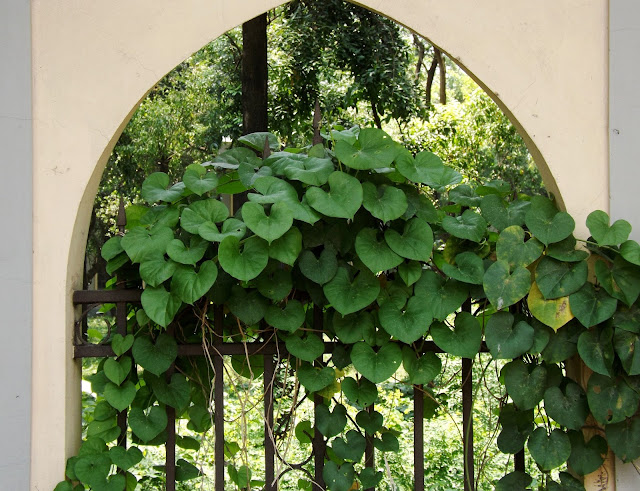Onguli lota or Tiger's footprint, Ipomoea pes-tigridis
Onguli lota or Tiger's footprint (Ipomoea pes-tigridis, family: Convolvulaceae) is an annual hairy climber from Morning glory family with beautiful leaves and spectacular milk-white showy flowers. Its entire body is covered with light brown-colored erect and long but soft hairs. It prefers open daylight and sandy as well as mildy wet soil. It usually climbs up when it finds a support but also likes to creep on the ground. Its length is usually not more than 4 meters. The twining climber is found in cropfields, beside roads, on fallow lands in Bangladesh. It is also found throughout tropical and subtropical regions of Asia and Africa.
Other names: Languli lota, Baghpoda.
Variations are seen in the size and shape of the leaves. These are minutely hairy, palmate, usually 5-7 lobes, but can be more than that; 5-10 cm wide, long-petioled. Midribs spread to each lobe arising from the center of the blade. The name of the plant 'Tiger's footprint' is given for this special shape of the leaves.
Flowers are in axillary head, showy and funnel-shaped like all the members of Morning glory family, 4-5 cm long and mouth 3-4 cm wide, white or pink-colored; corolla-tube lobes 5, but when counting the dividing lines, the number stands at 10.
It blooms in the afternoon and continues throughout the night. When the morning sun appears the flower closes its mouth. Flowering occurs in autumn (Sept-Nov).
Fruit is round capsule, brownish, glabrous, dehiscent. The plant is propagated by seeds.
It is said that a whole garden can be richly decorated only with different types of Morning Glory. Onguli lota, the stunning beauty can also get a place in this garden. It is used in the treatment of rabies and dropsy. Roots are used as purgative.
Synonyms : Convolvuloides palmata, Convolvulus bryoniifolius, Convolvulus capitellatus, Convolvulus hepaticifolius, Convolvulus pes-tigridis, Ipomoea capitellata, Ipomoea hepaticifolia, Ipomoea tamnifolia, Ipomoea tigrina, Ipomoea tigripes, Neorthosis tigrina.







Comments
Post a Comment